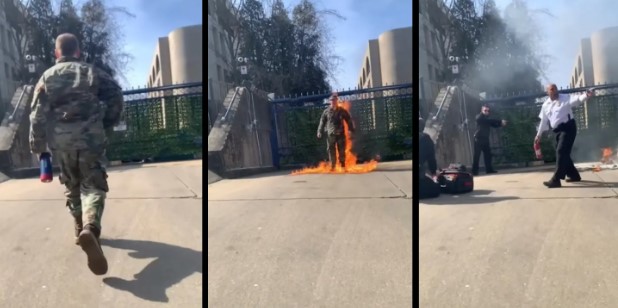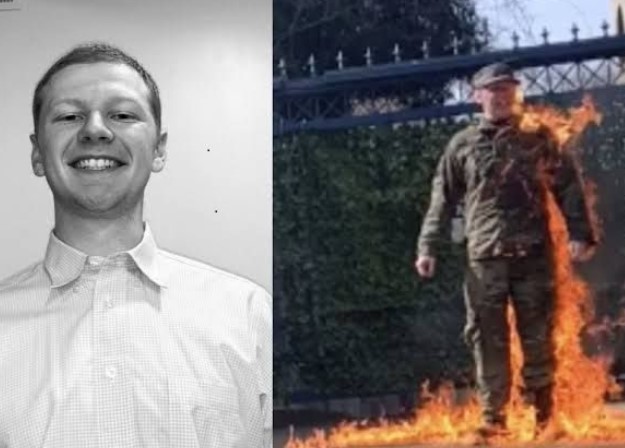Aaron Bushnell Unedited Video Content Leaks
The raw footage of Aaron Bushnell’s self-immolation outside the Israeli Embassy in Washington, D.C. is a distressing and tragic reminder of the human cost of the Israeli-Palestinian conflict. Bushnell’s final moments, captured in a chilling live broadcast, depict him calmly approaching the embassy gates, pouring flammable liquid over himself, and setting himself on fire. In the video, he proclaims, I will no longer stand by while genocide occurs in Gaza, and repeatedly shouts, Free Palestine! The video of Bushnell’s death has stirred up anger and contemplation about the ongoing conflict and the necessity for peace.

Contents
Aaron Bushnell Unedited Video
The Last Moments
Aaron Bushnell’s self-immolation was more than just a tragic event – it was a desperate plea for justice in the midst of a seemingly endless cycle of violence. As the flames consumed his body, his words echoed with a haunting urgency that could not be ignored.
For Bushnell, the Israeli-Palestinian conflict was not just a distant political issue – it was a personal call to action. His sacrifice was a stark reminder of the human cost of war and the devastating impact it has on individuals and communities.

In the wake of his death, there has been an outpouring of grief and anger from those who have witnessed his final moments. His act of defiance has reignited the debate on the need for a peaceful resolution to the conflict and the importance of standing up for justice and human rights.
VIDEO OF LATE AARON BUSHNELL WHO PASSED AWAY
Aaron Bushnell, 25, has passed away.
Graphic footage shows the U.S Army soldier set himself on fire as a show of Solidarity with the Palestinian cause in front of the Israeli Embassy.
He shouted: “I will no longer be complicit in… pic.twitter.com/KP8UJBOb8w
— Sulaiman Ahmed (@ShaykhSulaiman) February 26, 2024
As the world watches in horror at the video of Aaron Bushnell’s self-immolation, we are reminded that peace is not just a distant dream, but a necessity for the survival of all those caught in the crossfire of war. May his sacrifice not be in vain, but serve as a catalyst for change and a renewed commitment to ending the cycle of violence in the region.
The Consequences
On February 25, 2024, a shocking and tragic event took place outside the Israeli Embassy in Washington, D.C. Aaron Bushnell, an active-duty service member, set himself on fire in a heartbreaking act of self-immolation. The flames engulfed him as onlookers watched in horror, unable to comprehend the depth of despair that could drive someone to such a desperate act.
The news spread quickly, reaching the White House where President Joe Biden was informed of the incident. In the aftermath of Bushnell’s death, the White House issued a statement acknowledging the tragic nature of the event. It was described as a horrible tragedy that left a community in mourning and disbelief.
The Air Force also confirmed Bushnell’s status as an active-duty service member, adding another layer of complexity to the already devastating situation. Questions arose about what could have led a dedicated member of the military to take such extreme measures, and how his mental health and well-being may have been overlooked or neglected.
As the days passed, the shock and grief continued to reverberate throughout Washington, D.C. The tragic loss of Aaron Bushnell served as a somber reminder of the invisible struggles that many individuals face, even in the midst of their public service and dedication to duty. It sparked important conversations about mental health support for active-duty service members and the need for greater awareness and resources to prevent such heartbreaking incidents from occurring in the future.
The Effect
The death of Aaron Bushnell has sent shockwaves through his community, leaving his family and friends grappling with the loss of a bright and talented young man. His fellow service members are also struggling to make sense of his untimely death.
“Aaron was a shining light with a future full of promise,” expressed one of his close friends. “His passing has left a void in our hearts that can never be filled.”
Aaron’s final words, denouncing the violence in Gaza and declaring his refusal to be complicit in what he viewed as genocide, have struck a chord with people worldwide. His tragic death has reignited discussions around the Israeli-Palestinian conflict and the urgent need for peace.
“Aaron’s death serves as a stark reminder of the human toll this conflict has taken,” stated a peace activist. “It is time for all of us to come together and actively seek a peaceful resolution to end the senseless loss of life.”
As the community mourns the loss of Aaron Bushnell, his legacy lives on in the call for peace and justice in a world torn apart by conflict. May his memory inspire us all to work towards a future free of violence and oppression.
Aaron Bushnell’s Last Moments
Streaming Live with Bushnell
As the flames quickly consumed him, Aaron Bushnell’s final moments were a haunting display of protest and sacrifice. The chilling livestream that he broadcast on social media captured the dramatic scene that unfolded at the gates of the Israeli Embassy. With an air of determination, Bushnell calmly walked towards the embassy, carrying a bottle of flammable liquid.

Once he reached the gates, he wasted no time in dousing himself in the liquid and lighting a match. The flames erupted around him, engulfing him in a fiery inferno. Through the crackling flames, his voice could be heard as he declared, I will no longer be complicit in genocide in Gaza! The intensity of his words was matched only by the intensity of the flames that consumed him.
In his final moments, Aaron Bushnell’s message was clear. His act of self-immolation was a stark and desperate plea for the world to pay attention to the suffering of the Palestinian people. As the flames licked at his skin, he repeatedly shouted, Free Palestine! It was a cry that echoed in the hearts of all who witnessed his tragic sacrifice.
The livestream came to an abrupt end as the flames overtook Bushnell, leaving only a charred silhouette in their wake. His sacrifice had been made, his message had been delivered. And though the fire had extinguished his physical form, the flames of his passion and defiance would continue to burn bright in the hearts of those who watched in awe and horror.
Responses to the Livestream
The live broadcast of Aaron Bushnell’s self-immolation on social media platforms sparked a wave of reactions from people all over the world. Many viewers expressed horror and deep sadness witnessing the tragic death of Bushnell, as they grappled with the intense emotions stirred by such a distressing event. The graphic and heartbreaking nature of the livestream left a lasting impact on those who watched, prompting an outpouring of condolences for the late activist.
On the other hand, there were also those who praised Bushnell’s bravery and unwavering commitment to his beliefs. They admired his courage in taking such a drastic and extreme stand to bring attention to the ongoing Israeli-Palestinian conflict, even at the cost of his own life. For some, Bushnell’s act was seen as a powerful statement against injustice and oppression, garnering respect and admiration from supporters who rallied behind his cause.
However, amidst the mixed reactions, the incident also raised important questions about the role of social media in broadcasting such disturbing events. Many wondered about the ethical implications of sharing and consuming sensitive and graphic content online, especially when it involves tragic and traumatic events like self-immolation. The ease with which such videos can be circulated and viewed by a wide audience sparked debates about responsible media practices and the need for greater sensitivity towards the emotional impact on viewers.
Overall, the livestream of Aaron Bushnell’s self-immolation triggered a range of emotions and reflections on the complexities of the Israeli-Palestinian conflict, the limits of activism, and the implications of social media in shaping public discourse. As the world grappled with the aftermath of this tragic event, it served as a sobering reminder of the power and consequences of sharing such harrowing content in the digital age.
The Consequences of Aaron Bushnell’s Passing
The news of Aaron Bushnell’s tragic death sent shockwaves through his family, friends, and the broader community. As they grapple with the enormity of their loss, they have come together to remember him as a kind and compassionate person who was dedicated to social justice. They hold onto the hope that his untimely passing will shed light on the ongoing conflict in the Middle East and inspire a movement towards peace.
In the wake of Bushnell’s death, there has been a heated discussion about the role of social media in cases of self-immolation. Some argue that social media platforms should take a more proactive stance in preventing individuals from livestreaming their suicides, in order to protect vulnerable individuals from harm. On the other hand, there are those who believe that social media can serve as a powerful tool for raising awareness of important issues and facilitating conversations that need to be had. They argue that individuals should have the freedom to express themselves in whatever way they see fit.
The timeline of events leading up to and following Bushnell’s death serves as a stark reminder of the complex and interconnected nature of our world. On February 25, 2024, Bushnell set himself on fire outside the Israeli Embassy in Washington, D.C., sparking immediate shock and horror. The following day, the White House acknowledged his death as a “horrible tragedy,” underscoring the profound impact of his actions. On February 27, 2024, Bushnell’s family released a statement expressing their deep sorrow and unwavering hope that his death will serve as a catalyst for change.
As the community mourns the loss of a beloved member, they are faced with difficult questions about the intersection of social media, mental health, and activism. In the midst of their grief, they seek solace in the memory of Aaron Bushnell, a man who dedicated his life to making the world a better place.
Analyzing the Consequences of Aaron Bushnell’s Protest
Global Criticism and Indignation
The self-immolation of Aaron Bushnell has sent shockwaves across the globe, sparking international condemnation and outrage. The United Nations Human Rights Council has called for an independent investigation into his death, highlighting the need for justice and accountability in the Israeli-Palestinian conflict.
UN High Commissioner for Human Rights, Michelle Bachelet, described Bushnell’s act as a desperate cry for help, emphasizing the urgent need for a peaceful resolution to the ongoing conflict. The loss of life is always tragic, as reiterated by US State Department spokesperson Ned Price, who condemned the horrific act of violence and extended deepest condolences to Bushnell’s loved ones.
As countries like the United States, the United Kingdom, and France stand united in denouncing this tragedy, the world is reminded of the ongoing suffering and injustice faced by the Palestinian people. Bushnell’s self-immolation serves as a stark reminder of the urgent need for a just and lasting solution to the Israeli-Palestinian conflict, and a call to action for global solidarity in pursuit of peace and justice.
Demanding Peace and Ceasing Violence
Following the tragic death of Bushnell, the international community came together in a unified call for peace and an end to violence in the Israeli-Palestinian conflict. Activists, religious leaders, and politicians from around the world expressed their deep sorrow and urged for a renewed commitment to dialogue and negotiation.
The Middle East Quartet, consisting of the United States, European Union, United Nations, and Russia, issued a joint statement calling for an immediate cessation of violence and a return to negotiations. The Arab League condemned the incident and called for an international investigation to hold those responsible accountable.
The Organization of Islamic Cooperation called for a boycott of Israeli products and a suspension of diplomatic ties with Israel in response to the ongoing conflict. Pope Francis, leader of the Catholic Church, appealed for an end to violence and hatred, urging for prayers for peace to prevail in the region.
While the Israeli government expressed its condolences to Bushnell’s family, they refrained from commenting on the political implications of his death. Despite the differing approaches and perspectives, the universal message for peace and reconciliation resonated across borders, emphasizing the urgent need for a peaceful resolution to the longstanding conflict.
Conclusion
The tragic death of Aaron Bushnell has struck a chord in the hearts of many, shedding light on the deep-seated emotions and complexities that define the Israeli-Palestinian conflict. In a haunting unedited video of his final moments, Bushnell’s poignant words echo through the air, leaving a lasting impact on all who bear witness. His declaration, I will no longer be complicit in genocide, reverberates with a sense of defiance and unwavering determination for justice. The resounding cry of Free Palestine serves as a rallying call for peace and reconciliation in the midst of turmoil and bloodshed.
The untimely passing of Bushnell has sparked a wave of outrage and introspection, prompting individuals from all walks of life to question their role in perpetuating the ongoing conflict. As the world mourns the loss of a courageous soul, many are compelled to seek avenues for meaningful change and progress towards a more equitable and peaceful future for all. The legacy of Aaron Bushnell serves as a poignant reminder of the human toll of war and conflict, urging us all to strive for a world where justice, compassion, and understanding reign supreme.
It is important to note that the information presented here has been compiled from various sources and may not be entirely verifiable. As such, readers are encouraged to exercise caution when referencing this article for research or academic purposes.
Global News -Dale Earnhardt Cause of Death: Tragic Incident the Racing
Gymer Vs Boxing CCTV Video Original: A Battle of Wits
Max Pitbull Video Accident: The Accident and Its Aftermath
The Unraveling Drama of Elijah Jamerson A Halloween
Chris Appleton Ex-Wife From Past Relationships
The Pitbull Video Gore: Shocking Truth Revealed
Bahsid McLean Photo: Unveiling an Artistic Journey